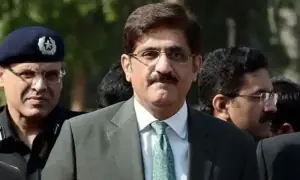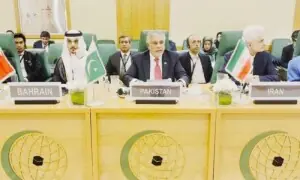Article 63-A: Dissident lawmaker’s vote will not be counted, rules SC
4 min readThe Supreme Court of Pakistan ruled on Tuesday that the vote cast by dissident lawmakers will not be counted.
The apex court announced the reserved judgment on the presidential reference, seeking interpretation of Article 63 (A) of the Constitution.
A five-member bench of the apex court headed by Chief Justice of Pakistan Umar Ata Bandial completed the hearing into the presidential reference.
These four instances are the election of prime minister and chief minister; a vote of confidence or no-confidence; a Constitution amendment bill; and a money bill.
Chief Justice of Pakistan (CJP) Umar Ata Bandial, Justice Ijazul Ahsan and Justice Munib Akhtar gave the majority verdict while Justice Mazhar Alam Khan Miankhel and Justice Jamal Khan Mandokhail were the dissenting judges.
The chief justice remarked that Articles 17 and 63 of the Constitution both talk about the rights of political parties, adding that both should be read together.
In its opinion regarding the disqualification of members, the apex court rejected the PTI’s plea, saving the lawmakers from permanently being barred from the Parliament.
The Supreme Court called on parliament to determine the timeframe for the disqualification of a dissident lawmaker. However, it did not give an opinion regarding the future measures that can be taken to prevent defection, floor crossing and horse-trading.
Earlier today
During today’s hearing, PML-N lawyer Makhdoom Ali Khan submitted his detailed response to the court.
Attorney General of Pakistan Ashtar Ausaf, while presenting his argument, said that questions pertaining to the public interest or the law could be raised in a presidential reference.
CJ Bandial inquired if the question asked under Article 186 was not related to the formation of the government.
The president had never sent such a reference in the past over similar incidents, the AGP replied.
Justice Ahsan remarked that the president did not need to seek legal advice from the attorney general before filing a reference.
Monday’s hearing
Chief Justice of Pakistan Justice Umar Ata Bandial said on Monday that Article 63-A protects the rights of a political party, adding that lawmakers are bound under the said Article to follow the policy of the political party they are affiliated with.
Justice Bandial made the remarks during the hearing of the presidential reference seeking the apex court’s opinion on Article 63-A of the Constitution, which is related to the disqualification of lawmakers over defection.
During the hearing, the bench expressed dismay at the absence of the attonery general and PML-N lawyer Makhdoom Ali Khan, who requested the court for extension for the completion of their arguments.
The apex court observed that the attorney general was trying to delay the case after promising to assist the court.
“This is one of the most important affairs of public interest. Their requests for extension mean that the incumbent government wants to defer the case,” CJP Bandial remarked, adding that the court wants to conclude the case soon.
Balochistan National Party-Mengal’s (BNP) counsel Mustafa Ramday, while presenting his arguments, said that he wouldn’t defend any dissident.
Ramday argued that Article 63(A) “restricts defection and explains the entire procedure in case of the offence,” adding that if the said article didn’t explain the procedure, the court would have the choice to consider Article 62-63.
He maintained that it was not necessary that the defection benefits anyone and that’s the reason the lawmakers kept de-seating as the punishment for defection.
The CJP questioned if Ramday wanted to say that de-seating was enough for defection.
At this, the lawyer maintained that he didn’t want to go beyond the procedure mentioned under Article 63(A).
CJ Bandial remarked that maybe the dissident member convinces the party chairman with his reasoning for defection.
“Our political parties do not have enough democracy to let that happen,” Ramday said while replying to the CJ remarks.
The court directed the PML-N counsel to submit his arguments in writing today. Later, the court adjourned the hearing on the presidential reference on Article 63(A) till tomorrow (Tuesday).
Presidential reference
In March, the PTI had filed a presidential reference seeking the apex court’s interpretation on measures to bar horse-trading.
The PTI made the decision to file the reference after dissident lawmakers of the ruling party were found at the Sindh House in Islamabad.
PTI Chairman Imran Khan and the PTI leadership had accused the dissident leaders of being “turncoats” while claiming that PPP was offering them money in return for their support in the no-trust vote seeking the then prime minister Imran Khan’s ouster.
For the latest news, follow us on Twitter @Aaj_Urdu. We are also on Facebook, Instagram and YouTube.
























Comments are closed on this story.